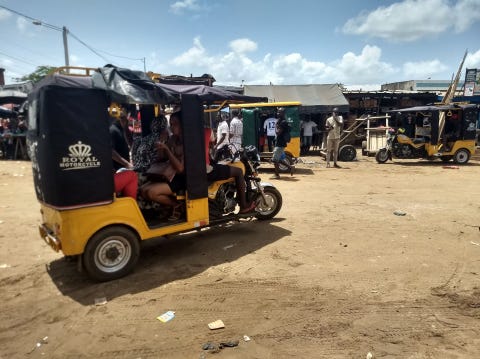#30 Musique pour les Transports Populaires
How one song saved informal transportation in Cote d'Ivoire
Hey there friend,
Here’s your fortnightly dose of Makeshift Mobility, your newsletter on innovations in informal transportation.
I touched a bit on gbakas, the minibuses of Cote d’Ivoire, in my last letter to you. I’ve learned more about them since, and more about salonis. I have some interesting tidbits for you.
Have you gotten vaccinated yet?
I got my first dose this week. Moderna flavor.
I hope you have, too. Or at least are scheduled for it.
I worry about my friends in the Philippines, India, and Brazil and all the other places where government incompetence is just exacerbating the crisis.
If there’s anything the pandemic has shown us, it’s that the public sector matters. Good government matters.
Before we dive into the informal transport of the Ivory Coast, some news that might interest you.
Eyes on India
The Micromobility Newsletter tells us that the electrification infra war is heating up in India.
Gogoro is partnering with Hero MotoCorp to build out a swappable battery network across India’s cities, and to manufacture two-wheelers that use the technology.
That’s going up against Ola Electric Mobility’s plans to build a Hypercharger Network which will be:
…the world’s largest, densest two-wheeler charging system, comprising 100,000 high-speed charging points in more than 400 Indian cities, Ola said Thursday in a statement. In the first year, the startup will set up 5,000 of the points in 100 cities, doubling such infrastructure in the country. Its scooters will also be bundled with a home-charging kit.
Fancy video here, but I’m wowed (skeptically wowed) by what appears to be automatic, multi-level charging stations. I mean, nice renderings but I do have to ask, what about the three-wheelers?
Ola Cabs, the mother company started as a ride hail company and basically beat Uber in the sub-continent. Ola Electric, which spun off two-years ago, also plans to scale up their manufacturing capacity to 10M electric two-wheelers a year.
Taiwan based Gogoro, of course, is one of the pioneers in the electric two-wheeler market and leveraged their innovation of battery swapping kiosks to grow a global footprint.
Meanwhile, Hero already dominates India’s two-wheeler market. I’m sure you’d be very interested in Quark 1, their play to enter the three-wheeler passenger market.
It’s a “two-in-one” motorcycle and auto rickshaw. (Yes, the motorcycle part can disengage from the auto rickshaw part. Cool, huh? They say it was inspired by the horse-and-buggy.)

Ok, let’s dive into Abidjan’s makeshift mobilities.
Multiple Marginalities
Despite having suffered two civil wars in the last two decades, Cote d’Ivoire or the Ivory Coast continues to be one of the fastest growing economies in Sub-Saharan Africa. It is also one of the most urbanized countries in the continent.
“More than a half—56 percent—of the Côte d’Ivoire’s population lives in urban centers, with urbanization increasing at a high rate of 5 percent yearly.” (World Bank, 2018.)
How do urban Ivorians get around? A lot still travel by foot (41-42%) but the motorized travel is overwhelmingly through public, shared transportation. Less than 10% of Ivorians own a car.
Public transport mostly equals woro-woros, gbakas, and salonis, a.k.a. shared taxis, minibuses, and three-wheelers.
Here’s a pretty video of Abidjan from Mayeul Akpovi. Jump to 1:45 for a view of gbakas on the road.
Makeshift Mobility: Inception
Salonis are actually relatively new to the scene. Apparently they started around 2019, emerging on the outskirts of Abidjan.
You can dive into the history and context via Jacob Doherty, Vakaramoko Bamba, and Irène Kassi-Djodjo’s Multiple Marginality and the Emergence of Popular Transport: ‘Saloni’ Taxi-Tricycles in Abidjan, Ivory Coast.
Where did the name come from?
The name saloni is derived from a Hindi soap-opera that airs every afternoon on Ivorian TV. Seeing vehicles reminiscent of the rickshaws that appear on the show, passengers gave this new form of transport the nickname saloni, the name of the main character.

Oh, btw there’s a push to make salonis electric and solar.
Let’s jump to gbakas.
Show me the money
There are at least 5,500 gbakas in Abidjan. If you do some rough estimates, that means the sector employs at least 11,000 drivers and the same number of apprentis (fare collectors) and countless touts and mechanics.
Modal stats from 2013 show gbakas carry 33% of all transport in the city, woro-woros 44%, metered taxis 9%, and buses and ferries run by Société des Transports Abidjanais (SOTRA, or the Abijan Transport Company) move 12%. (WB’s undated numbers claim just 16% for gbakas, 21% for woro-woros, and 10% for SOTRA.)
Meanwhile, only $10M of the $350M WB funded Abidjan Urban Mobility Project will go to some sort of vehicle upgrading for gbakas. (Little more than $1,800 per gbaka if you were going to hand that out.) Most of the money for the Urban Mobility project will go to Bus Rapid Transit for SOTRA. And, very typically, imagines that informal transportation just becomes “last mile feeders.”
Assets not problems
You’ve heard me say it before, one of the things we need to do is to reframe informal transportation as assets. We especially don’t want to nickel-and-dime the transformation.
Yes, we don’t want to discount the issues but we need to go beyond the typical problematizing frames, such as WB’s:
“the ageing of the artisanal urban transport fleet (taxis and mini- buses) and its lack of maintenance represent major environmental, public health, and road safety problems. With an average age of 16 years, the fleet of vehicles of the small-scale, informal public transport is indeed old and particularly polluting.”
Going back to Doherty, Bamba, and Kassi-Dodjo’s paper:
Here, we can see how the conceptual language of informality operates within discourses that devalue, marginalize, and displace established forms of popular mobility. Nonetheless, the experience of other cities shows that even when plans call for a complete overhaul of transport systems through transitions to mass transit and formal infrastructure, popular transport continues to play an important role, giving rise to complex hybrid systems (Ferro and Behrens, 2016; Klopp and Cavoli, 2018; Schalekamp 2017). Even as the national government and World Bank (2016) “re-imagine Ivorian cities” through integrated investments in logistics industries and mass transport projects, popular transport will continue to occupy a marginal position, offering vital mobility services, particularly in peripheral areas where they serve critical last-kilometer connections.
Saved by a song
Of course there’s a song. Two songs, in fact. Served for your pleasure.
In 1976, the song “Gbaka” by Daouda Le Sentimental, actually saved gbakas.
Apparently the Ivorian Minister for Public Transport issued an order that would ban gbakas. The excuse being there were too many accidents. Aux Sons tells us the rest of the story:
Daouda Koné began working in Ivorian television as a technical controller. During his lunch breaks, he would reel off some of his own compositions on his acoustic guitar to entertain himself and his co-workers. On spotting his talent as a singer-songwriter, his colleagues in production invited him onto their musical variety shows. His romantic, humorous songs were popular with viewers, soon earning him the nickname “Daouda Le Sentimental”…
Georges Taï Benson, the then director of programming for the national television network, decided to produce his first 45T entitled “Gbakas”…
…Hamed Touré, host of Radio Côte-d’Ivoire’s morning show, played the song on repeat. The effect was viral; it spread across the country. In every backstreet tavern, maquis (working-class Ivorian restaurant), snack kiosk and office, Daouda’s “Gbaka” sparked public debate about the Minister for Transport’s unacceptable plan…The palpable discontent rose to the highest levels of government and the decree was suspended…Informal transport continued unabated, but gbakas became forced to undergo roadworthiness tests.
(Sorry, I couldn’t find the lyrics.)
That song goes out to some of you who think that popular culture that wraps around makeshift mobility doesn’t matter. It does.
Songs about, and art on, informal transportation matter.
Apprenti
I mentioned apprentis, the fare collectors of gbakas. Voice of America gives us an inside view of their experience (from 2009).
Kouassi Kouakou Bertin, 26, nicknamed the Dioula, usually a generic name for northerners, stands in front of his gbaka, which is cleaner than most.
Since the start of the 2002 civil war, Bertin explains, he willed and worked himself down from the de-facto rebel capital, Bouake, to Abidjan, CFA franc by CFA franc.
He worked as a fare collector, a job called apprenti here, meaning apprentice.
He finally earned enough money to afford a driver's license - a luxury for most, and now he drives a gbaka.
Bertin's own apprenti calls out the fare, 250 CFA francs, or about 50 cents, to the center of town.
The apprentice yells out, there is no change, not even for 500 francs or 1,000 francs.
Change is a problem in Ivory Coast, where vendors will not sell you anything, if you give them a big bill, and they have no change.
In this case, no change means no trip in the gbaka.
Venez monter avec la monnae
I leave you with your last song from this newsletter.
It’s Apprentis Gbaka by Fababy. (Lyrics courtesy of Le roi Mohammed 7.)
Apprentis Gbaka by Fababy
vieux morgor faut garer, prochain arret, ferronerie apres barrage
cherie coco ou tu t'en vas?
y'a une place faut monter
faut faire vite la police arrive
au moins j'espere que t'as jetons
si y'a pas faut descendre pas faut faire
ça va devenir palabre
monsieur, madame, devant, derrière, transport
mais avec la monnaie SVP
sinon c'est collage
venez monter avec la monnae 2 togo
venez monter avec la monnae 2 cents
venez monter avec la monnae 2 togo
cocody là venez avec la monnae 300
Here’s how google translates it:
old Morgor must park, next stop, ironwork after dam
dear coco where are you going?
there is a place to go up
have to hurry, the police are coming
at least I hope you have tokens
if there is no need to go down, no need to do
it will become palaver1
sir, madam, in front, behind, transport
but with the change please
otherwise it's collage
come up with 2 togo coin
come up with the 2 cents coin
come up with 2 togo coin
cocody2 there come with the coin 300
No change, no ride
Ah, isn’t that the rub. We’re not going to change makeshift mobility until we change the way we see it and approach it.
I’m looking at you, World Bank.
Sermon over. Go in peace.
Leave me a comment, if you enjoyed this letter.
I’m Benjie de la Peña and I’m the CEO of the Shared-Use Mobility Center. I co-founded Agile City Partners, and I am the Chair of the Global Partnership for Informal Transportation.
I dream of making a Mixed-tape for Makeshift Mobility that will not only save informal transportation but will convince national and global leaders to pour out billions of dollars in investments.
I’m convinced that informal transportation can be the single greatest lever to decarbonize the urban transport sector, but only if we stop ignoring it and instead learn to celebrate it so we can transform it.
What’s a “mixed-tape” -? Ok, my dear millennial, let’s just call it a playlist.
palaver • \puh-LAV-er\ • noun. 1 : a long discussion or meeting usually between persons of different cultures or levels of sophistication 2 a : idle talk b : misleading or beguiling speech. Merriam-Webster.





